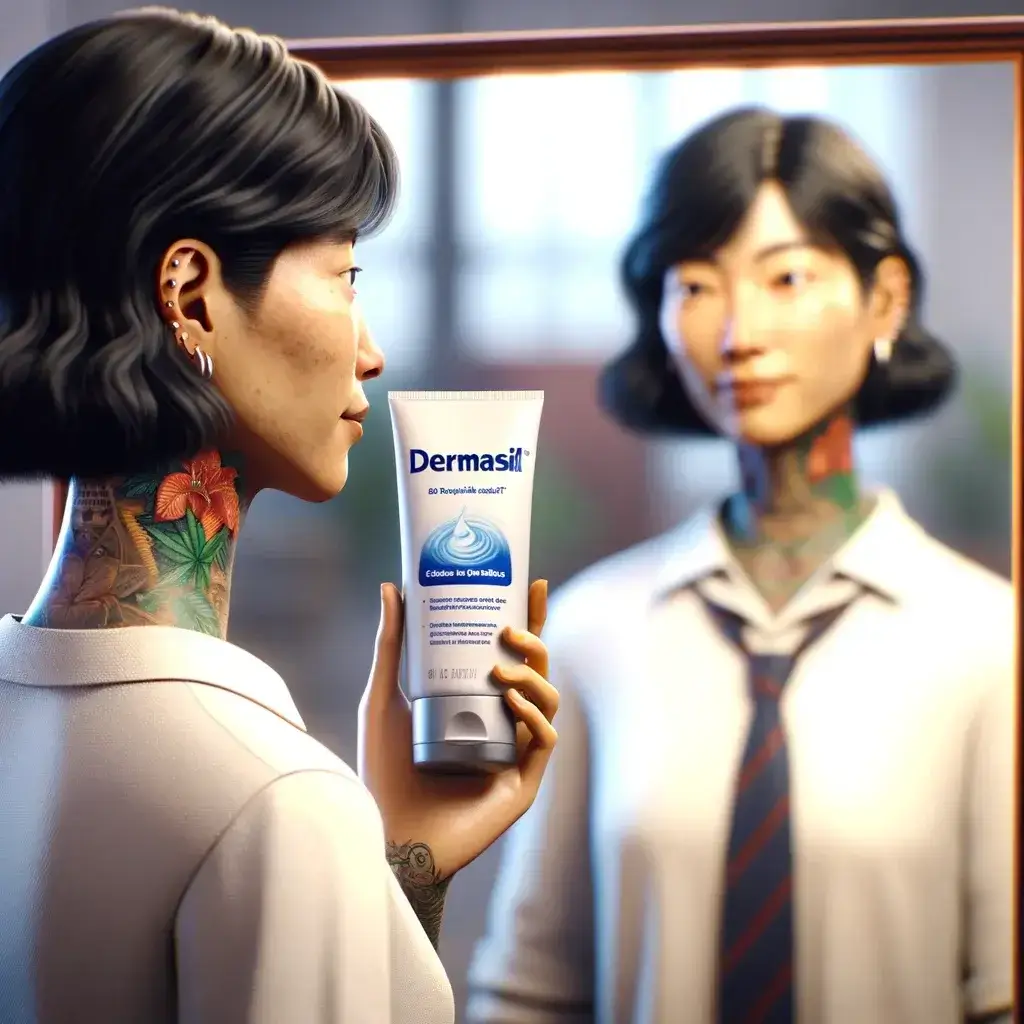“Is Dermasil good for tattoos”, this question often arises among those fresh from the tattoo parlor.
While Dermasil is not a brand made specifically for tattoo aftercare, it has gained attention in the tattooing process.
Many tattoo artists and enthusiasts ponder over its suitability for preserving the vibrancy of tattoo ink and the health of the skin.
A critical aspect of tattoo longevity is how it’s cared for in the years following its creation; poor aftercare can lead to ruining the intricately envisioned artwork.
Although Dermasil offers a range of products for skin care, its efficiency in the specific realm of tattoo aftercare is debatable.
Some users find it equally good, if not better, compared to other aftercare products, while others remain cautious.
The key lies in the individual’s skin response and the specific requirements of their tattoo, making personal research and adherence to a tattoo artist’s recommendation crucial.
Also Read: Is Bactine Good For Tattoos
What Is Dermasil?
Dermasil is a skin care brand offering a range of products like cleanser, toner, moisturizer, and exfoliator; designed to hydrate, nourish, and provide gentle exfoliation to improve the skin’s appearance, minimizing fine lines and wrinkles.
5 Benefits Of Using Dermasil On Tattoos
- Anti-Fungal And Anti-Bacterial: Beneficial for preventing common skin conditions like athlete’s foot, jock itch, and ringworm, Dermasil’s properties help keep the tattoo clean and free from infection.
- Soothing and Healing: It can soothe and heal the skin, especially useful in conditions like eczema and psoriasis, which are often a concern with new tattoos.
- Speeding Up Healing: Applying Dermasil may help to speed up the healing process of a new tattoo, especially important in the first one to three days after getting a tattoo.
- Reducing Scarring Risk: The ointment’s formulation can reduce the risk of scarring, maintaining the integrity and appearance of the tattoo.
- Compatibility with Other Products: Dermasil can be used in conjunction with other popular aftercare products such as Aveeno, Lubriderm, Gold Bond, and even Dermalize, creating a comprehensive aftercare routine.
In addition, while lanolin is known for pulling ink from tattoos, Dermasil formulations suitable for tattoo care avoid this ingredient, ensuring the tattoo’s longevity.
When compared to typical handsoaps like Dial Gold, Dermasil offers a gentler option for tattoo aftercare, making it a viable alternative for those looking for a product that’s both effective and gentle on their new ink.
Also Read: Can You Get A Tattoo On Accutane

The Risks Of Using Dermasil On Tattoos
While Dermasil, a topical silicone gel primarily used to treat scars, has found its way into the realm of tattoo aftercare, there are certain risks associated with its use on tattoos.
First, there’s limited evidence on whether it’s harmful or effective for tattoos. It’s essential to test Dermasil on a small area of the skin before applying it to a tattoo, as it can cause skin irritation, which might disrupt the healing process.
Another risk involves the potential of Dermasil to make the tattoo prone to infection or affect the vibrancy of its colors.
Despite being FDA approved for treating scars, its safety and efficacy for tattoos aren’t as clear. Users should be aware of possible side effects like redness and burning.
As always, consulting with a tattoo artist and opting for ointments specifically designed for tattoos is advisable to avoid any problems and ensure the best healing outcome.
Also Read: Mastering Tattoo Care: How Long To Leave Tegaderm On Tattoos
Dermasil Lotions Ingredients To Watch Out
When considering Dermasil products for tattoo aftercare, it’s important to be mindful of certain ingredients.
Dermasil, a skincare brand, offers a range of creams, lotions, ointments, and soaps that can be used on freshly-inked tattoos.
However, not all ingredients are beneficial for a tattoo, which is essentially an open wound needing time to heal.
- Fragrance And Alcohol: Avoid lotions with fragrance or alcohol. These ingredients can cause adverse reactions on the skin, potentially ruining the tattoo. Alcohol can dry out the skin, while fragrance, a term for various perfuming ingredients, can lead to irritation.
- Lanolin And Petrolatum: Be cautious of lanolin, an oil from sheep wool, known for being comedogenic (pore-clogging) and its tendency to pull ink from the tattoo. Similarly, petrolatum or petroleum products create a skin barrier that may block contact with air, crucial for healing.
- Dimethicone And Silicone: On the positive side, ingredients like dimethicone, a form of silicone, can help accelerate the healing rate and reduce scarring. They can be beneficial but should be used judiciously.
It’s essential to select Dermasil lotions that are fragrance-free and alcohol-free, especially for a new tattoo. Each tattoo is unique, and so is the skin it’s on, making it crucial to choose products that support rather than hinder the healing process.
Dermasil Lotions That Are Usable For Tattoos
When it comes to Dermasil lotions for tattoo aftercare, there are options that can be particularly beneficial for your inked skin.
These lotions are designed to support the healing process and maintain the vibrancy of your tattoos. Here are some Dermasil lotions to consider:
- Dermasil Dry Skin Treatment Original Lotion: This lotion is known for its effectiveness in providing hydration and soothing dry skin. It’s also artificial fragrance-free and alcohol-free, making it a safe choice for tattoo aftercare.
- Dermasil Labs Eczema Relief Moisturizing Lotion: If you have a sensitive tattooed skin or experience skin conditions like eczema, this lotion can be a great option. It contains dimethicone, a core ingredient that helps reduce scarring and promotes healing.
When caring for your tattoo, it’s essential to choose the right products, especially during the 3rd to 4th week when your tattoo is completely healed.
Dermasil offers lotions that cater to the specific needs of tattooed skin, ensuring your ink stays vibrant and your skin remains healthy.
Also Read: Healing With Art: Discover How Soon After Laparoscopic Surgery Can I Get A Tattoo?
How To Use Dermasil Lotion For Tattoo Aftercare?
When it comes to tattoo aftercare, choosing the right products is crucial. That’s where Dermasil lotion comes into play, offering a simple and effective solution.
Drawing from my experience in skincare and tattoo maintenance, I’ve found Dermasil to be a surprisingly adept choice for this purpose. Let’s dive into the two easy steps that make this lotion a standout option.
1. Cleaning The Tattoo
When it comes to cleaning the tattoo, it’s essential to use the right technique and products.
Start by gently washing the tattoo under running water – this can be done at the sink or in the shower. It’s important to use either cold or lukewarm water to avoid irritation.
Opt for a fragrance-free, antibacterial soap to ensure cleanliness without harsh chemicals. Lather the soap in your hands and carefully clean the area; remember, no washcloth should be used as it can be too abrasive.
Once the soap is applied, rinse thoroughly, making sure no soap residue remains. This process should not take more than 10 minutes.
After rinsing, gently pat dry the area with clean paper towels – avoid using cotton towels as they may leave lint or aggravate the skin.
Be aware of any sticky ink that may be released during the first few washes; this is normal and part of the healing process.
2. Applying The Lotion
When it comes to the aftercare of a tattoo, applying the lotion correctly is as vital as choosing the correct product.
After ensuring your skin is either dried or slightly damp, it’s time to apply the lotion. Dermasil, specifically, comes highly recommended for this purpose.
Start by squeezing a small amount from the squeeze tubes and warm up the lotion in your hand. Use broad downward strokes to apply an even layer over the tattoo surface.
It’s crucial not to over-moisturize; if you do, simply take a power towel and dab off any excess lotion.
Gently massage the lotion until it’s fully absorbed, then allow it to air-dry. This keeps the skin moisturized without overdoing it, making the healing process easy and effective.
Also Read: Is Dermasil Good For Tattoos

5 Things To Avoid For A New Tattoo
For your new tattoo to heal correctly, avoid actions that can disrupt the healing process and determine its outcome.
1. Warm Water
Using warm water on a new tattoo can cause the pores to open, risking unsettled tattoo ink to seep out or leak, potentially discoloring or ruining the design.
2. Soaking For Too Long Or Submerging In Water
Soaking for too long or submerging a new tattoo in water can introduce bacteria to the wound, increasing the risk of it getting infected, as advised by tattoo artists; avoid activities like swimming until it’s fully healed.
3. Direct Sunlight
Direct sunlight can be detrimental for both new tattoos and old tattoos; sun’s ultraviolet (UV) rays cause the breakdown of pigments in tattoo ink, especially when it’s absorbing and not settled.
Use sunscreen with ingredients that are not too harsh and cover with loose clothing.
4. Scented And Bar Soap
Scented soap often contains fragrances and chemicals that can be harmful to a healing tattoo; it’s best to avoid.
Similarly, bar soaps may harbor bacteria on their surface, increasing the risk of infection; opt for antibacterial liquid soap instead.
5. Petrolatum Or Petroleum-Based Products
For your tattoo, it’s wise to avoid petrolatum or petroleum-based products; unlike Dermasil products which are safer and have lower concentrations, these can clog pores, block access to air, and hinder the skin’s ability to naturally heal, even with a thin layer.
Also Read: Optimize Tattoo Aftercare: Is Dial Gold Good For Tattoos?
Frequently Asked Questions About Is Dermasil Good For Tattoos
1. Are Healing Ointments Bad For Tattoos?
While healing ointments can be beneficial for a tattoo in the first three days, switching to a moisturizing lotion like Dermasil is advised, as ointments are heavier and can block air from reaching the healing skin.
2. Is Coconut Oil Good For Tattoos?
Coconut oil, rich in vitamins, can be beneficial for a tattoo due to its healing properties, but due to its comedogenicity, it should not be used daily, especially on new tattoos.
3. Is There A Risk To Using Dermasil On Tattoos?
Dermasil is generally safe for tattoos, but it’s important to check its ingredients; substances like lanolin, while rare, can ruin a tattoo or cause an allergic reaction in those sensitive to particular ingredients, posing a risk to tattooed skin.
4. How To Heal A Tattoo Without Ointment?
To heal a tattoo without ointment, use substitutes like lotion instead of petroleum jelly or Vaseline; ensure the area is clean before applying.
5. How To Clean Your Tattoo If You Forget To Wash It?
If you forget to wash your tattoo for a day, clean it as soon as you remember, being extra careful if it’s itchy or irritated; ensure it gets oxygen and wash more often afterwards.
Also Read: Unlock The Secret: Why Is My Tattoo Shiny And What It Means For You?
Conclusion
When addressing the question, “is Dermasil good for tattoos,” it’s clear that Dermasil, a reputable brand in skincare, offers safe and effective solutions for tattoo aftercare.
Although not specifically made for tattoos, the ingredients in Dermasil products are often considered among the best lotion for new tattoo.
It’s crucial to research and understand the needs of your tattoo to ensure it looks great for a long time.
Remember to always listen to your tattoo artist’s recommendation, as their expertise is invaluable in guiding you towards the most suitable aftercare products.
Dermasil’s gentle and nourishing properties make it a viable option for many, reinforcing its standing as a beneficial choice in tattoo aftercare routines.
Also Read: Calf Tattoo Hurts To Walk?
